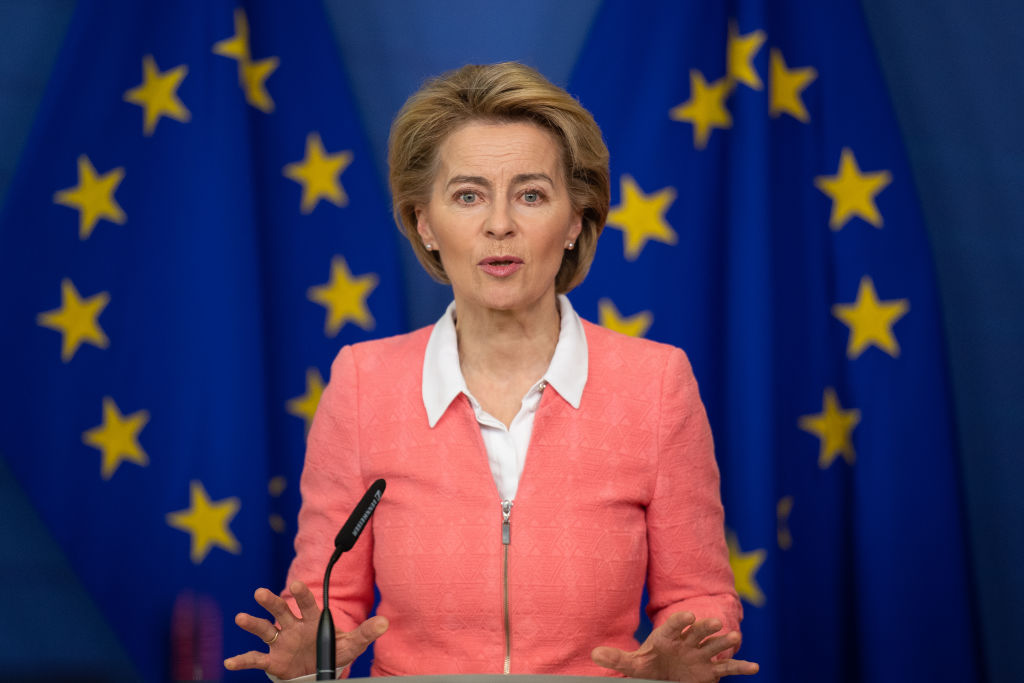I know we’re all meant to be quaking over the election result in Italy. That we’re all supposed to be gnashing our teeth over the ‘first far-right politician since Mussolini’ to lead the Italian people. That is how much of the media is referring to Giorgia Meloni, leader of the Brothers of Italy party and now on course to become Italy’s first female Prime Minister following the victory of the right-wing bloc in Sunday’s elections.
And yet I find myself far more concerned – troubled, in fact – by the behaviour of Brussels than by anything that has happened in Italy. Consider the comments made by the President of the European Commission, Ursula von der Leyen. On Thursday, three days before Italy’s elections, she was asked what she thought of the prospect of a right-wing victory in that member state. Chillingly, she replied that the EU has certain ‘tools’ that it can use against Italy if it chooses to go ‘in a difficult direction’.
Take that in. What she was effectively saying is that if the Italian people made the ‘wrong’ choice, if they put into power politicians who hold supposedly incorrect thoughts, then they would be punished. ‘Tools’ would be wielded to make them regret their political transgression. As one report said, von der Leyen was clearly referring to the EU’s ‘ability to cut funds’ to nations that displease the oligarchy in Brussels. Now, millions of Italians have made that ‘wrong’ choice. They’ve dared to deviate from von der Leyen’s preferred ‘direction’ for their country. How long before those ominous ‘tools’ are marshalled against them?
Von der Leyen’s comments strike me as more extremist than anything I’ve heard Ms Meloni say. The idea that Meloni is a modern-day Mussolini, fascism cleverly disguised in the garb of a professional modern woman, is silly. She has clearly distanced Brothers of Italy from its questionable past and her most prominent policies cannot be described as fascistic in any way at all. She wants to cut taxes, resuscitate nuclear power, manage migration, and increase welfare allowances to families. It’s hardly the March on Rome, is it?
Ms Meloni is also a clear-minded critic of the new politics of identity and the way it negates older, more traditional forms of identity. National identity, religious identity, family identity – all are under attack, she says, by cultural establishments that would rather reduce us to ‘citizen X, gender x, parent 1, parent 2’. If it is ‘far right’ to be concerned about the erasure of the language of womanhood and motherhood, and to believe that family life and a sense of loyalty to one’s nation are good things, then millions of Brits and Italians must be fascists. Many, many people are similarly concerned that their way of life is forever being smirked at and undermined by the laptop elites.
It is very important to challenge the misuse of the word ‘fascist’. Whether it’s Joe Biden describing Trump supporters as ‘semi-fascist’, Brexit voters being accused of dragging Britain back to the 1930s, or Italian voters being told off for allegedly putting Mussolini 2.0 into power, too many of a left persuasion use the slur ‘fascist’ to demonise their opponents. This is a terrible thing to do. First, because it just isn’t true – the vast majority of the people they’re talking about are not fascists. And second, because it demeans the real historical experience of fascism, the unique horror of it all, to compare everything ‘bad’ that happens now with what happened back then.
So, to be clear: I don’t think Ursula von der Leyen is a ‘fascist’. She may be a powerful German politician with a penchant for bossing around smaller European countries, but she absolutely is not a fascist. Her comments were, however, extreme. She made them at Princeton university. On Italians going to the polls, she said: ‘If things go in a difficult direction – and I’ve spoken about Hungary and Poland – we have the tools.’
Not surprisingly, Hungarian and Polish politicians were not happy with what she said, either. Having experienced sanctions and funding cuts at the hands of the EU – for their allegedly problematic policies – these nations know exactly what von der Leyen meant by her passive-aggressive threat. The Polish Prime Minister, Mateusz Morawiecki, nailed it. ‘Von der Leyen’s statement was scandalous’, he said. ‘She said Brussels had the tools to discipline Italy if it created a government that would not be in favour of Brussels. Is this the Europe we want? The Eurocrats in Brussels dictate what the government should be about?’
Once again, the EU’s instinctive, bristling contempt for democracy has been exposed. ‘If you vote for politicians we disapprove of, there will be consequences’ – that is essentially what President von der Leyen was saying to the good people of Italy. As a democrat, I believe the people of Italy have every right to choose their rulers, and that they should not be threatened with reprimand and impoverishment for exercising that right. Meloni and her colleagues are not Eurosceptic enough for my liking, but it seems pretty certain that tensions between Brussels and Rome will now rise. Good. Perhaps the Italian people’s patience with Brussels will run out. We had Brexit – next Quitaly?







Comments